Local Dairy Farmers Excited As Arla Foods Distributes Milk Cans To Improve Quality

In line with its commitment to advance local dairy development in Nigeria, Arla Foods, makers of Dano Milk, has empowered smallholder dairy farmers in Kaduna with training and funding through the Advancing Local Dairy Development in Nigeria (ALDDN) program.
The Advancing Local Dairy Development in Nigeria (ALDDN) is a five-year program being implemented in conjunction with Sahel Consulting and other private sector companies to catalyse a vibrant local dairy sector in an inclusive way that improves the livelihoods, productivity, nutrition, and empowerment of smallholder dairy farmers and the communities in which they live.
Speaking during a ceremony held to distribute the first batch of milk cans to 30 farmers in Gadan Gayan Community in Kaduna State, the Dairy Site Manager, Arla Foods, Ewarts Samuel, noted that the main objectives of the program are to increase demand for locally-sourced milk from smallholder dairy households, empower women dairy farmers, while also improving smallholder dairy farmers’ productivity.
He disclosed that the program recently purchased 900 milk cans for distribution to smallholder dairy farmers in Nigeria, which is expected to help preserve milk received from the farmers and ensure that high quality and good hygiene are maintained during milking and transportation.
“Arla is currently partnering with the local dairy farmers by offtaking their milk through our plant that is located in Kaduna State, where the milk is processed into yogurt under the MILCOPAL brand. Under the ALDDN program, Arla also facilitates training programs for smallholder dairy farmers and provides funding support for certain key endeavours,” Samuel said.
In his remarks, Project Assistant, Sahel Consulting, Ahmed Mohammed, stated that the partnership with Arla Foods is geared towards transforming Nigeria’s agriculture and nutrition landscape.
“We are excited to be part of this partnership as this would help a great deal in addressing food security, malnutrition, and unemployment which will, in turn, drive economic growth and prosperity for families, communities, and Nigeria in general,” Mohammed said.












